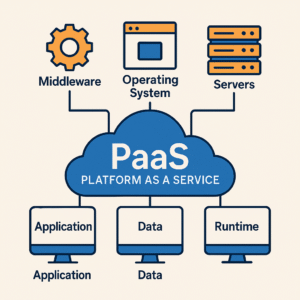By Byteapple Technologies – Building Scalable Tech for a Mobile-First World
In today’s digital-first landscape, mobile technology is no longer a luxury—it’s a strategic necessity. From the early days of SMS-based marketing to the dominance of mobile apps, mobile technology has continually evolved, shaping how businesses engage, convert, and retain customers.
Understanding Mobile Technology in Business
On a broad level, mobile technology encompasses everything from SMS, mobile-responsive websites, and push notifications, to fully-featured mobile applications. The era of mass text marketing gave way to mobile-friendly websites, which in turn sparked the long-standing debate: Mobile Site vs. Mobile App.
The clear winner? Mobile Apps.
Mobile apps offer a seamless, fast, and immersive user experience—something that mobile sites still struggle to match. Once downloaded, they remain accessible at the tap of a finger and offer deeper engagement through features like personalization, offline access, and device-native capabilities.
Choosing the Right Platform: Where Do You Build?
With Android leading global smartphone usage and iOS closely behind, businesses often face a tough decision: which platform to build for? The answer lies in knowing your target audience and their preferred devices.
- Native Apps (built specifically for Android or iOS) deliver the best performance, but require separate development efforts.
- Cross-platform Apps (built using tools like Flutter or React Native) offer broader reach with a single codebase, but may lack full access to native features.
At Byteapple Technologies, we help you evaluate the best approach—native vs. cross-platform—based on your business goals, technical constraints, and user expectations.
Redefining Purpose: What Type of App Does Your Business Need?
Once the platform is chosen, the next step is identifying the purpose and category of your app. Broadly, apps fall into two main categories:
1. Revenue-Generating Apps
These apps aim to directly (or indirectly) generate income via:
- App purchases or subscriptions
- In-app purchases (IAPs)
- Ads and affiliate marketing
Think e-commerce apps, subscription-based services, or mobile games with in-app monetization. These apps are built with clear business models and ROI in mind.
2. Branding & Customer Engagement Apps
These apps serve as extensions of your brand, focused on improving customer experience, support, and loyalty. Examples include:
- Loyalty program apps
- Service request or ticketing apps
- Brand engagement tools for retail or events
Though they may not directly bring in revenue, these apps contribute to long-term customer retention, brand loyalty, and business visibility.
Final Thoughts from Byteapple
Mobile technology continues to reshape how businesses operate—from marketing and sales to customer service and brand building. At Byteapple Technologies, we specialize in helping small to medium-sized companies transform their ideas into scalable mobile solutions using modern stacks like React Native, Golang, and Flutter.
Whether you’re building an income-generating app or a powerful brand experience, we’re here to help you navigate the complexities of mobile development—from platform selection to post-launch scaling.
📩 Need help with your mobile app idea? Let’s build it the smart way
